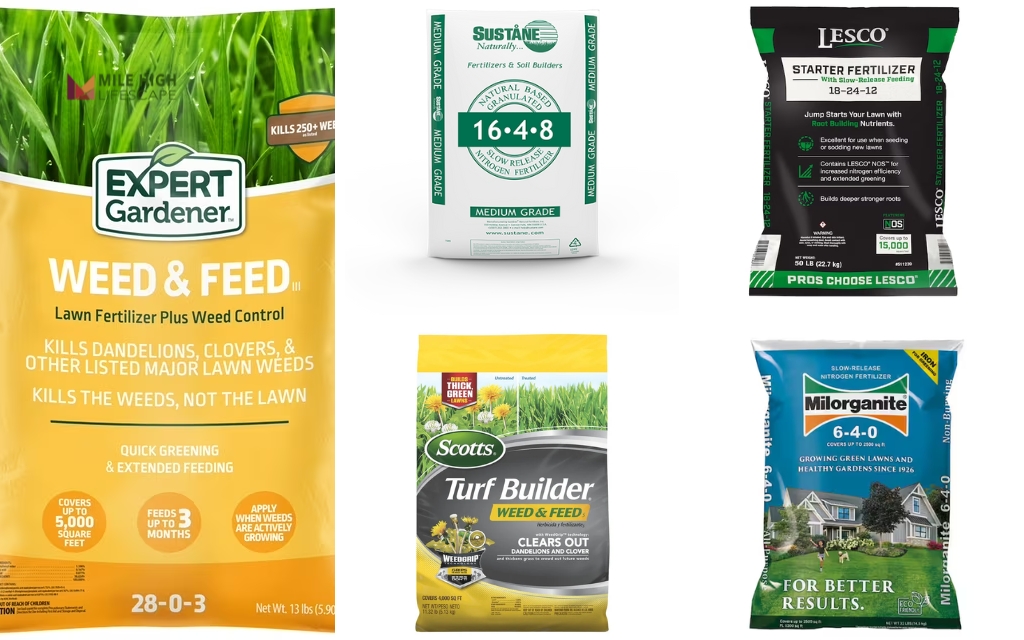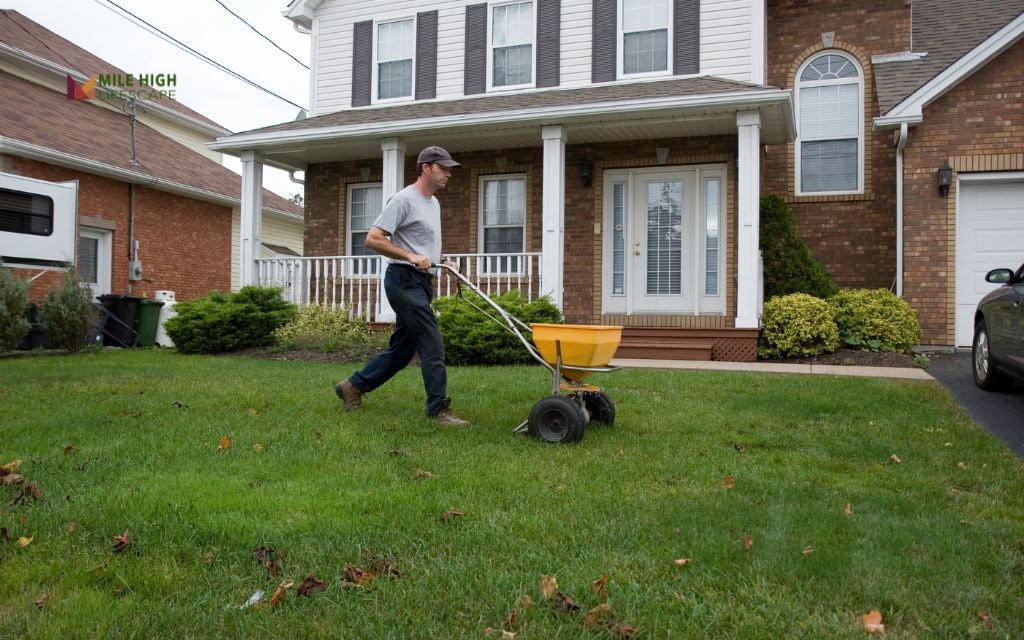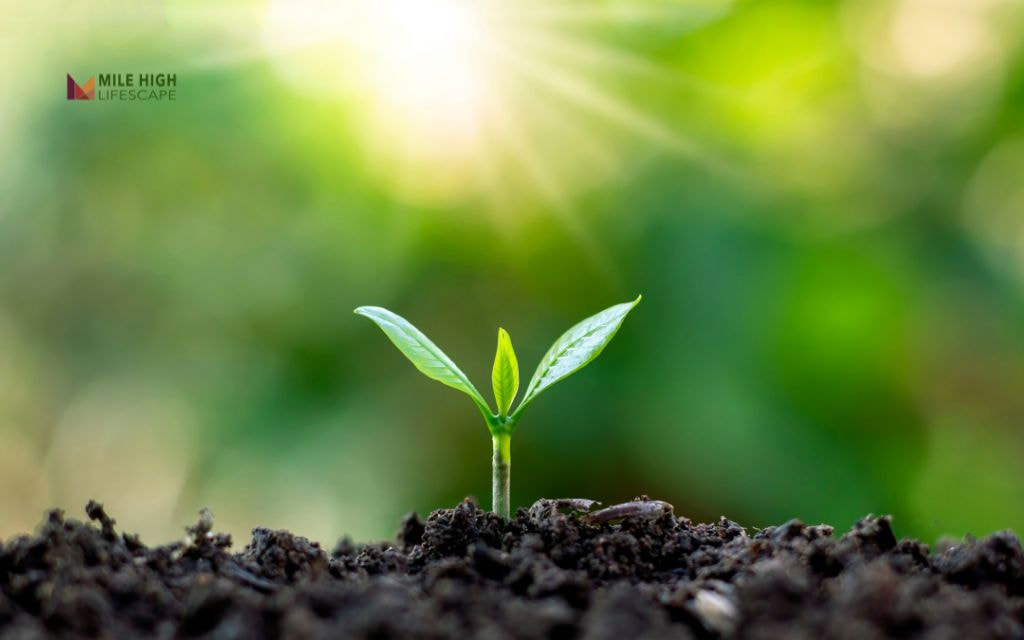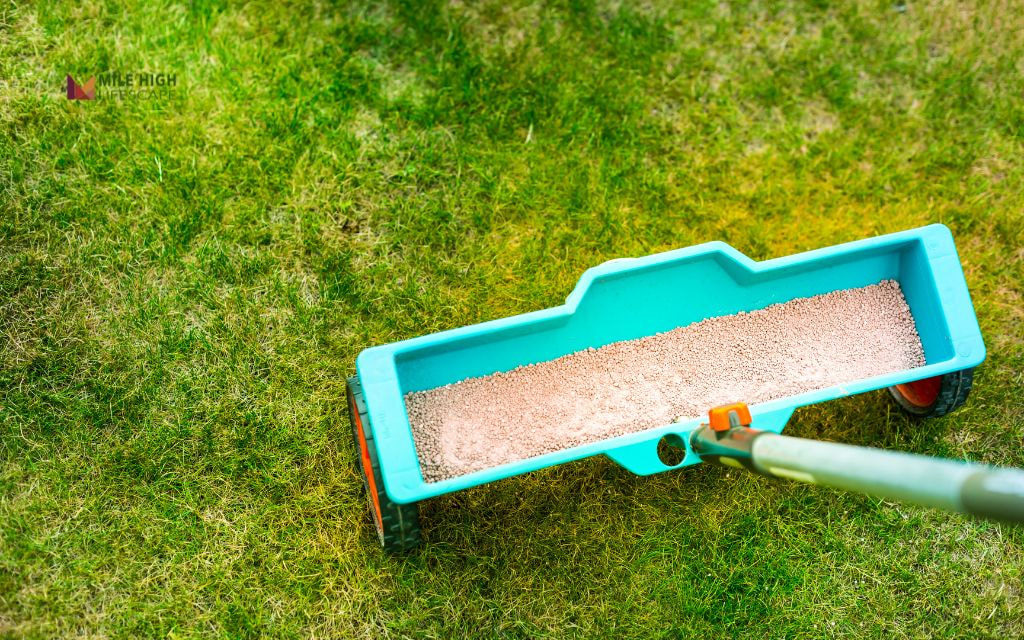Denver’s challenging environment presents unique obstacles for lawn care enthusiasts. The combination of high altitude, limited rainfall, and naturally alkaline soil creates a complex growing environment that demands specific fertilization strategies. Without the right nutrients, even well-maintained lawns can struggle to thrive in our distinctive Mile High climate.
At Mile High Lifescape, we understand these challenges firsthand. This guide will equip you with knowledge to select best organic lawn fertilizer that address your lawn’s specific needs while considering our region’s environmental factors.
Best Organic Fertilizer for Green Lawns
Different fertilizer formulations address specific lawn conditions and seasonal requirements. The following comparison highlights options particularly effective for Denver’s unique growing environment:
| Fertilizer Type | Best For | Pros | Cons |
| Slow-release Nitrogen (28-0-3) | Overall lawn health maintenance | Reduces leaching, feeds consistently for 6-8 weeks, minimizes burning risk | Higher initial cost, slower initial green-up |
| Organic Compost Blend (4-1-2) | Building soil structure, sustainability | Improves microbial activity, enhances water retention, environmentally friendly | Requires more product volume, results develop gradually |
| Starter Fertilizer (18-24-12) | New sod establishment, overseeding | Stimulates root development, accelerates establishment | High phosphorus content requires careful application near waterways |
| Weed & Feed Combination | Lawns with broadleaf weed pressure | Combines fertilization with targeted weed control | May stress certain grass types, application timing critical |

Seasonal Fertilization Guide for Year-Round Lawn Health
Timing fertilizer applications to match your lawn’s growth cycle maximizes effectiveness while minimizing waste. Denver’s climate demands a specific seasonal approach that differs from lower-elevation regions:
| Season | Optimal Timing | Fertilizer Type | Application Goal |
| Spring | Late April/Early May (soil temp 55°F+) | High nitrogen (24-0-6) | Support initial growth surge, establish deep roots |
| Early Summer | Mid-June | Balanced with iron (20-0-5 + Fe) | Maintain color during peak growth, prepare for heat stress |
| Late Summer | Mid-August | Light, slow-release (16-0-8) | Recovery from summer stress, prepare for fall |
| Fall | Early October | Winterizer with potassium (22-0-10) | Build carbohydrate reserves, strengthen roots for dormancy |
This schedule aligns with the natural growth cycles of cool-season grasses that dominate Denver landscapes. The spring application takes advantage of natural growth energy while the crucial fall feeding prepares your lawn for winter dormancy and spring recovery.

Sustainable and Eco-Friendly Fertilizer Options
Denver’s watershed connects directly to numerous waterways, making environmentally responsible fertilization practices essential. Excessive nutrients that run off lawns contribute to water quality issues throughout the region.
Let’s explore eco-friendly alternatives that protect our local environment while maintaining healthy lawns.
Compost-Based Products
Compost delivers slow-release nutrition while improving soil structure—a dual benefit for Denver’s clay soils. These products work by:
- Releasing nutrients gradually as microorganisms break down organic matter
- Creating air pockets in dense clay soil to improve drainage
- Increasing the soil’s water-holding capacity, reducing irrigation needs
- Adding beneficial microbes that help grass absorb nutrients efficiently
Apply a ¼-inch layer of quality compost as a top dressing in spring or fall for best results. For established lawns, use a compost spreader or apply after core aeration when soil is exposed.
Biosolid Fertilizers
Products like Milorganite provide slow-release nutrition from recycled organic matter. These fertilizers:
- Feed soil microorganisms, creating a healthier soil ecosystem
- Release nutrients only when soil conditions (moisture and temperature) allow for plant uptake
- Contain essential micronutrients often missing from synthetic formulas
- Resist leaching, even during heavy rain events
Apply according to package directions, typically at a rate of 36 pounds per 2,500 square feet for Denver lawns. The iron content in these products helps counteract our alkaline soil’s yellowing effect.
Specialized Organic Supplements
Natural materials addressing specific lawn needs include:
- Alfalfa meal: Provides nitrogen and growth stimulants that encourage root development
- Feather meal: Offers high-nitrogen content (up to 12%) that releases slowly over several months
- Bone meal: Supplies phosphorus for new lawns without synthetic chemicals
- Kelp or seaweed: Contains growth hormones and micronutrients that improve stress resistance
These supplements typically require more frequent application than synthetic options but build soil health over time. Most perform best when soil temperatures consistently exceed 60°F.

Natural Minerals for Soil Improvement
Certain minerals address Denver’s specific soil challenges:
- Greensand: Loosens clay soil while providing potassium and trace minerals
- Gypsum: Breaks up compacted soil without changing pH, improving water penetration
- Sulfur: Helps temporarily lower pH in alkaline soil, making nutrients more available
- Rock phosphate: Provides a slow-release source of phosphorus for new lawn establishment
Apply these minerals according to soil test recommendations, as overuse can create imbalances. Most work best when incorporated into soil through aeration.
What Makes a Fertilizer the “Best”?
The ideal lawn fertilizer delivers essential nutrients in balanced ratios while addressing Denver’s specific growing conditions. Understanding fertilizer labels provides crucial information about product formulation and appropriate application.
Nutrient Balance
The three numbers on fertilizer packaging (N-P-K) represent the percentage of nitrogen, phosphorus, and potassium by weight. Denver lawns typically benefit from higher nitrogen (N) for green growth, moderate potassium (K) for drought and disease resistance, and minimal phosphorus (P) due to environmental restrictions and naturally adequate soil levels.
Release Technology
Slow-release formulations distribute nutrients gradually over 6-8 weeks, reducing leaching and providing consistent feeding. Quick-release fertilizers deliver immediate greening but require more frequent application and increase runoff risk during summer thunderstorms.
Formulation Type
Granular fertilizers offer convenience and longer shelf life, while liquid concentrates provide immediate availability and uniform distribution. The best choice depends on your application equipment and time constraints.
Environmental Impact
Consider products with reduced environmental footprint through water-soluble nitrogen, recycled ingredients, or natural organic materials that build soil structure while feeding your lawn.
Mistakes to Avoid When Choosing or Applying Fertilizer
Even high-quality fertilizer delivers poor results when improperly selected or applied. Avoid these common pitfalls:
- Mismatching product to grass type: Different turf varieties have distinct nutrient requirements. Using bluegrass fertilizer on fescue wastes resources and stresses your lawn.
- Over-fertilizing: Excessive application doesn’t create proportionally greener grass but instead promotes thatch buildup, disease susceptibility, and environmental runoff.
- Applying before rain: Heavy precipitation within 24 hours of application washes nutrients into storm drains instead of your soil. Check weather forecasts before fertilizing.
- Using weed-and-feed products preventatively: These combination products work effectively only when weeds actively grow. Application during dormant periods wastes herbicide and risks lawn damage.
- Neglecting post-application irrigation: Fertilizer granules must dissolve to release nutrients. Water thoroughly after application (about 1/4 inch) to activate the product and prevent leaf burn.
- Spreading unevenly: Inconsistent application creates patchy growth and color variations. Invest in a quality spreader and follow pattern guidelines for uniform distribution.

Conclusion
Selecting the best lawn fertilizer transforms your lawn care results in Denver’s challenging climate. The appropriate product, applied at optimal times using proper techniques, creates resilient turf that withstands our environmental stresses while requiring fewer inputs over time.
For homeowners seeking professional guidance, Mile High Lifescape offers comprehensive lawn fertilization services tailored specifically to Denver properties. Our expertise in local growing conditions ensures your lawn receives precisely what it needs for optimal health and appearance throughout the year.
Contact Mile High Lifescape today for a free lawn assessment and fertilization recommendation.
Frequently Asked Questions (FAQs)
What is the best fertilizer ratio for Denver lawns?
Most established Denver lawns perform best with fertilizers featuring a 4:0:2 or 4:1:2 N-P-K ratio. These provide adequate nitrogen for growth, minimal phosphorus (which most Denver soils already contain sufficient amounts of), and moderate potassium for drought and disease resistance.
Should I fertilize before or after mowing?
Mow first, then fertilize. Fresh cutting allows fertilizer to reach the soil more effectively rather than clinging to longer grass blades. Wait 24-48 hours after fertilizing before mowing again to allow nutrients to be absorbed properly.
Can I use organic fertilizer in early spring?
Organic fertilizers depend on soil microbial activity to release nutrients, which remains limited until soil temperatures consistently reach 65°F. For early spring applications (April-May), either use a blended product containing some synthetic nitrogen or delay organic-only applications until soil warms adequately.
How do I know if my lawn is under-fertilized?
Under-fertilized lawns typically show uniform pale color (versus patchy yellowing which indicates other issues), slow recovery from traffic damage, thin growth, and minimal clippings during mowing. Conduct a soil test to confirm nutrient deficiencies before increasing application rates.
Is fertilizing allowed during Denver water restrictions?
Yes, fertilization remains permitted during water restrictions, but product selection becomes crucial. Choose drought-tolerant formulations with higher potassium content and apply before forecasted light rain when possible to minimize additional irrigation needs.

